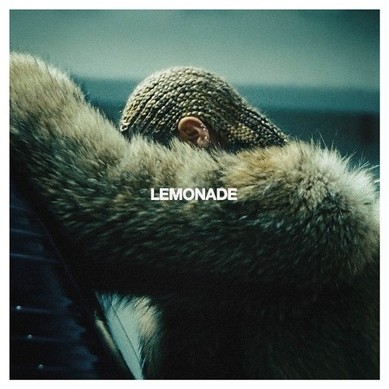
Favorites: Pray You Catch Me, Daddy Lessons, Sandcastles, Freedom
Dislikes: 6 Inch, Sorry, All Night
Overall: Though a little inconsistent and melodically dry, it's her most emotive work and first fable
When Beyoncé surprise-released a self-titled record in 2013, it was praised for allegedly being raw, philosophical and individually ground-breaking. Some people called it her Thriller (Michael Jackson's iconic album, of course). I shook my head and rolled my eyes at these adjectives and notions; it was like I was the only one who could tell the purse was knockoff Versace. With popular music, all you have to do is put explicit sexuality and language over tunes that wouldn't normally be considered radio-friendly and voila! False sense of authenticity and innovation. Luckily for Bey, she got 1,000 additional bonus points because the project came unannounced and she hadn't sung about sperm, surfboarding, or (vicariously) used the word "feminist" yet (it's fascinating how an album that features a rap verse likening violence to sexual performance and lyrics such as "I did this all for you boy, just come my way...I just want to be the girl you like" was called her most feminist one, but okay). Credit was given when it wasn't due. She hadn't truly challenged herself, taking a textbook route to liven things up. "Oh, but all the themes!" You mean the conflicting assortment of concepts that were underdeveloped because the writing and organization had holes? "Oh, but the music is so different!" It is on every record (something she should get more credit for). "Oh, but she gave us videos with it!" There was a video anthology for 2006's B'Day. After the word-vomit and gothic ratchetry that was BEYONCÉ, my hunger pains for certain things from my fave worsened. I didn't want her to just be known as a great entertainer, but a great artist too. I wanted her to rise to her own occasion and potential. I had developed a wish-list; among my desires was heartfelt, thoughtful lyrics, topic diversity and an all-lady team of producers/writers to really get a female perspective (I remember a behind-the-scenes clip where Pharrell told her she'd free all the women with "Rocket." How in the hell would he know what would free us?). Though February's "Formation" had aspirations of honoring black culture, majority of the lines were irrelevant to that cause and kind of ridiculous. Additionally, the trap beat and throbbing bass triggered my self-titled post-traumatic stress. I tried to hold onto my mild optimism that an upgraded BEYONCÉ was on the horizon for her 6th LP, and that's what we got... legit Versace.
Set on the aphorism of "when life serves you lemons, make lemonade," (as you will hear delivered by Jay-Z's grandmother), Beyoncé presents her first narrative, bringing back warm memories of Destiny's Child's Destiny Fulfilled. Lemonade's trajectory, however, isn't as victorious and joyous. It's an acutely desolate voyage through the experience of infidelity, each song exploring various emotional stages, like unease, paranoia, inferiority, fury and longing. These stages are broken down and expounded on in the partnering mini-film of the same title (aired on HBO on 4/23), where her main character's micro dilemma is used to discuss interrelated macro issues of gender and family, like generational abuse, unfaithfulness and paternal abandonment. Touched on are the sacrifices and compromises women make to be considered more desirable, the bullets they bite (either to survive or retain what society says should be important to them) and how their contributions are often taken for granted and disrespected. This is brought to life by the beautiful and gut-wrenching poetry of young Kenyan-born Somali author Warsan Shire, who became the Young Poet Laureate of London in 2014. The assisting imagery is nothing short of compelling and complex as well. There's a suicide scene with Beyoncé jumping off a rooftop in the first 5 minutes, at the conclusion of the opening track "Pray You Catch Me." Unlike most scenes of this kind, we see every inch of her fall, to the point I turned away because I thought they were going to show the land (she alights in a body of water, transitioning to the next section). I thought "Okay...this is going to be intense." Nature, tribal, African, historical and religious symbols are threads, but references to New Orleans and black southern ethos dominate, much akin to the "Formation" video. The intent to speak specifically to black women and their walk is apparent, but aside from the talent being entirely African-American and female, the emphasis is most pronounced with a Malcolm X speech excerpt ( "The most disrespected...unprotected...neglected person in America is the black woman") and appearances by the mothers of Trayvon Martin, Eric Garner and Michael Brown, who have yet to see justice for the murders of their sons. Many other moments, like cameos by athlete Serena Williams and actresses Zendaya Coleman, Quvenzhané Wallis and Amandla Stenberg--all of whom have faced racially-charged criticism--are more subtle (the common denominator between them may not instantly occur to the mind, for example). Succeeding this sequence is the second-to-last poem. A recipe for lemonade is given and the following is recited: "Grandmother, the alchemist, you spun gold out of this hard life, conjured beauty from the things left behind...discovered the antidote in your own kitchen...you passed these instructions down to your daughter, who then passed it down to her daughter." It's striking commentary: black women come out of the womb cursed to a life of lemons, left-overs and scraps barely suitable to be called such, but something's missing if this is the thesis of which this entire project is laid (after all, there is no song called "Lemonade").
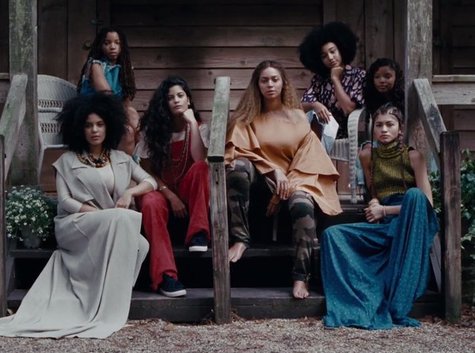 Stenberg (Top R) & Coleman (Bottom R) guest star in the "Lemonade" film (Parkwood)
Stenberg (Top R) & Coleman (Bottom R) guest star in the "Lemonade" film (Parkwood) The music ended up being an appetizer to the film, when it should have been the entree. This didn't happen because there was a movie instead of individual clips, or because we saw it first. This is an effect of the movie being disproportionately heavier than the album. Without the imagery and poetry, the focus is squarely on infidelity, changing the context of making lemonade from the black woman's plight (and several interconnected matters) to trying to keep whatever remnants are left of a marriage post-adultery. The latter theme pales in comparison to the former: less intriguing, less breathtaking, less informative and more.... *Deena Jones voice* common. Again, similar to "Formation," Beyoncé cheated with the visuals, hanging all the meat there versus in the music. Compound this with the visuals not being the most transparently conclusive, and it's like, "Hmmm...there's a bit of a consistency problem here." This isn't me asking, "Why not the moon?" after King Bey gave me diamonds out of her own womb (shout-out to Jill Scott). The problem is arguably a modest one since she's a rookie at this type of endeavor and gave us more to process than she ever has (kudos, gold-stars and entire cookie jars for that; thank the Creole gods), but like your favorite Tyler Perry movie, you notice the gaps and where things could be improved. I shouldn't be hoping she'll do a set of explanatory videos as she did the last era. I shouldn't have to watch a film or absorb additional media to get the whole idea of an album. To connect the dots, it would've helped tremendously if Shire's pieces were also used on the record (coming from me, that's saying a lot because I normally hate spoken interludes), and if "Freedom" and "Formation" weren't the only songs on the album giving me Black-ish, like Tracee Ellis Ross. Moreover, it's sort of disappointing (and, once more, confusing) that they were outnumbered and the record wasn't doused in blackness. The audio has one issue outside of those caused by the film, but I'll get into that later. I'm eager to talk about what I liked and loved.
When I used "acutely desolate" as a description earlier, I meant it. Part of why many believe this LP is autobiographical is because Beyoncé genuinely sounds like she is at the crest of brokenness and/or rage. It's almost painful to listen to; depressing in the least. This is especially the case with "Sandcastles," a song about a hesitant heart sitting in a pool of broken promises. She roughly growls, wavers off key and, finally, when her voice cracked singing, "What is it about you that I can't erase, baby, when every promise don't work out that way?" I started crying. Then, the ominous lower register piano keys of "Forward" dong in like a second kick to the stomach, with the haunting voice of English electronic artist James Blake. The lyrics are a call to move "forward" in a positive direction, but sonically, there's a black cloud hovering over. This paradoxical quality is also found on "Hold Up" and "All Night." "Hold Up" has a whimsical island breeze (including a sample of the 2011 bouncy love celebration "Countdown") and Bey's delivery is floaty, but she's about to snap, is feeling like a doormat and is practically trying to convince her lover that no one is better than she is. It's quite sad, really. Selling herself, she reminds him of her devotion, backseat antics and how the other women he may be entertaining would ignore him if he wasn't successful. In a similar vein, on "Love Drought" she pouts "Tell me, what did I do wrong?...Am I not thirsty enough?...Spend my life in the dark for the sake of you and me...Them old bitches so whack, I'm so tough, what's up?" The part of me that goes to Bey to feel unaffectedly invincible can't deal with all of this pleading, playing the comparison game and what I call "auditioning" (i.e. selling yourself; if your value isn't immediately seen and always respected, you probably shouldn't be around), but I digress. "All Night" is widely viewed as the sunny, hopeful and redemptive conclusion to this woeful tale, but I construe it as anything but a happy ending: A) "Found the truth beneath your lies, and true love never has to hide..." B) "I'll trade your broken wings for mine, I've seen your scars and kissed your crime...Beyond your darkness, I'm your light...Baptize your tears and dry your eyes..." C) "They say true love's the greatest weapon to win the war caused by pain...nothing real can be threatened..." D) "My torturer became a remedy..."
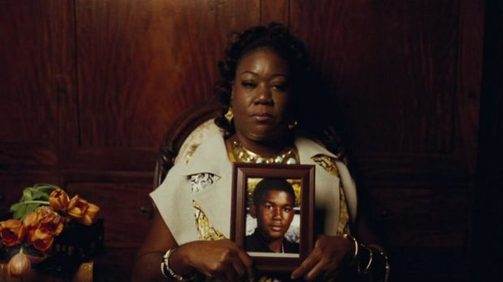 Sybrina Fulton holds a portrait of her son, Trayvon Martin, who was killed in 2012 (Parkwood)
Sybrina Fulton holds a portrait of her son, Trayvon Martin, who was killed in 2012 (Parkwood) The last half of the track-list is as follows: "Love Drought," "Sandcastles," "Forward," "Freedom," "All Night" and "Formation." Storyline-wise, I can understand why "All Night" is as close to the end as possible (particularly for the film), but musically, it's the "bitch that kills the vibe" coming after "Freedom" (featuring Kendrick Lamar). Thunderous, tramping drums, wailing organs, sampled hymns, Bey's gusty vocals declaring war on obstructions, and Lamar's gravely rhymes about the hunting and stigmatization of black men, and how they live on the edge of death daily--it's so impelling! Light up your torches! I'm fired up! I'm ready to go! So, when this chill cut with flying horns starts (i.e. "All Night"), I have an Obama "Wait, what??!" face. Just throw an ice-cold bucket of water on me and call it a challenge, then. Put "Freedom" before "Formation" and we can talk.
"Don't Hurt Yourself" with Jack White (yeah, White Stripes band Jack White) is just as match-stick evoking. It's "Ring the Alarm" on ecstasy pills and it's bloody-fantastic. Angry, "woman thou art loosed" Bey is one of my favorite things. I love the lyrical double-connotations. In one of the few instances where palpable confidence is exuded (sheesh!), the protagonist proclaims super-human status. Cheating is not only appalling as it's mendacious, but because it's been done to a goddess, to which the antagonist is inferior. She avers that her lover doesn't function on his own and she remains with him due to love, not because he's worthy: "Motivate your a**, call me Malcolm X; your operator or innovator...You don't love me deep enough, we're not reaching peaks enough; blindly in love, I f***s with you 'til I realize I'm just too much for you...When you hurt me, you hurt yourself, when you play me, you play yourself, when you lie to me, you lie to yourself, when you love me, you love yourself--love God herself." Underneath, the boasting could be a pep-talk to herself ("Hold Up" does precede "Hurt") and the falling lines could be indicative of a mindset of oneness with him. She begs for her romantic bubble to stay intact in the pre-chorus, auditions ("You know I give you life") and chooses not to leave at the end, despite her dismay (supporting my "All Night" bullet biting theory). This begs the question if "if you try this sh*t again, you gon' lose your wife" is an idle threat. I typically don't care for expletives outside of rap and rock for a variety of reasons, but Bey's generous usage here (I think she uses every one) wasn't gratuitous. The language having a designated role is why I almost let "Sorry" slide for being vapid and trite. I get that it's supposed to display a brazen, carefree attitude (ex. "Suck on my balls, I've had enough"), but we can still be adept. Fortunately, much of the other material is so, gratifying a major hunger pain.
 All Night: fan artwork by Jenn Tran (JennTranArt.tumblr.com)
All Night: fan artwork by Jenn Tran (JennTranArt.tumblr.com) Two of my favorite poems in the movie address just how much of a contravention adultery is and how sex is a covenant-creating act: A) "So, what are you going to say at my funeral now that you’ve killed me? Here lies the body of the love of my life, whose heart I broke without a gun to my head. Here lies the mother of my children, both living and dead. Rest in peace, my true love, who I took for granted...who, because of me, sleep evaded. Her shroud is loneliness. Her god was listening. Her heaven will be a love without betrayal. Ashes to ashes, dust to side chicks."
B)"...Grief sedated by orgasm, orgasm heightened by grief. God was in the room when the man said to the woman, 'I love you so much. Wrap your legs around me. Pull me in, pull me in, pull me in.' Sometimes when he’d have her nipple in his mouth, she’d whisper, 'Oh, my God.' That, too, is a form of worship... Whenever he pulls out, loss. '"
These excerpts tell of an anguished experience that, because it's such a regular occurrence, it's treated passively. The heart and the body are the greatest, most intimate gifts we possess as human beings. It's a gaping and life-altering wound when they're extorted, exploited or squandered. As societal constructs (primarily heterosexual) would have it, these gifts are taken as a given from women, for men to have at their disposal. Though the film, album and product description aren't as uniform as intended, and the title's definition is fairly ambiguous, one thing is patent: Lemonade is an illustration of what it looks like when a woman's soul is assaulted and under attack. Amid what has captured and sustained my adoration for Beyoncé is that she's constantly been FUBU: for us, by us. Her methods and execution infallible or not, giving women something productive or relatable to listen to has steadily been an objective. She pressed herself and extended her emotional bounds to craft a composition, a story that would get further into the tissue of these belittled wounds to let the blood fall like tears; a release. A well-deserved rant: f**k these lemons!! An artist of her visibility and status has everything to lose by proudly hurling culture and race when Caucasian audiences prefer you to eternally hide your spots and stripes, but Beyoncé is "painting white flags blue" ("Freedom"). That takes ovaries. At just under 46 minutes, Lemonade is Beyoncé's shortest record, but it's her most rending and impactful. A landmark in her discography...for real this time.
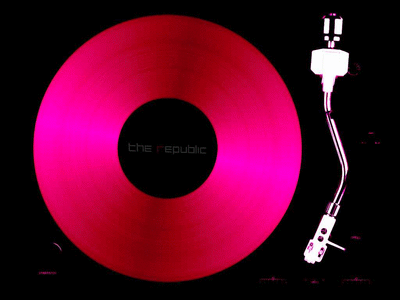
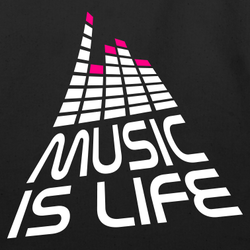
 RSS Feed
RSS Feed